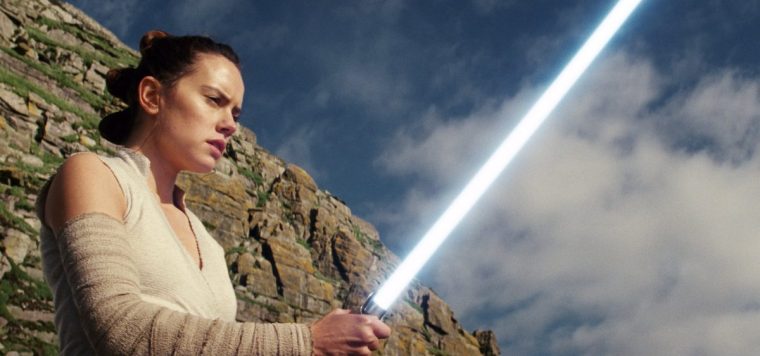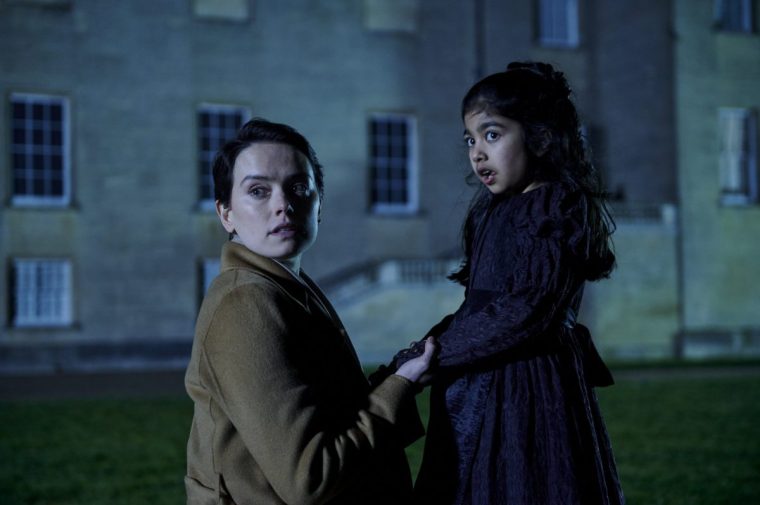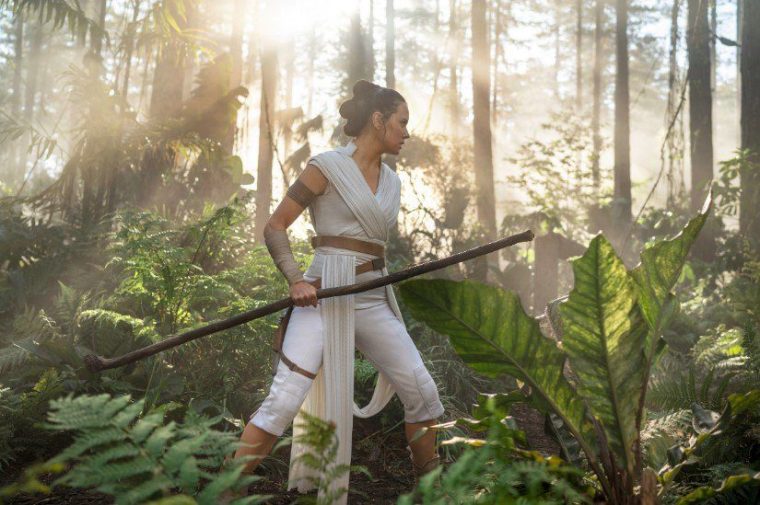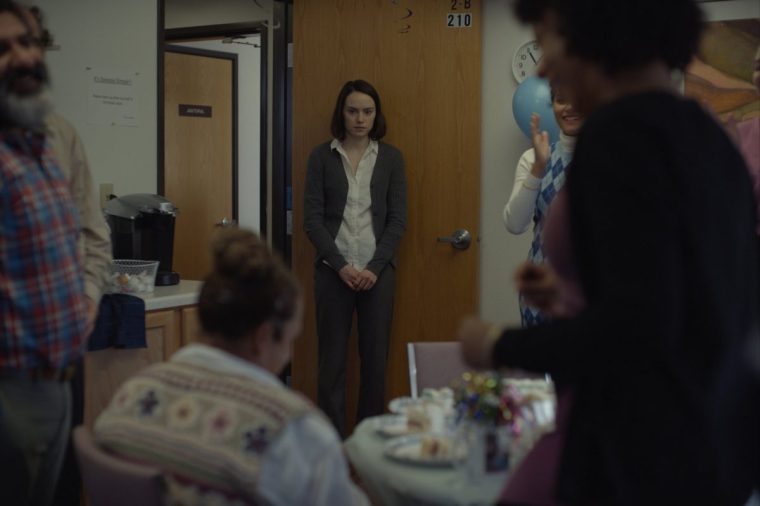When Daisy Ridley had an idea for a film about a marriage turned toxic, the first person she approached to write it was her husband.
“My original idea was about an actress trying to infiltrate a family,” says the 32-year-old, who first sprang to global fame in the 2015 Star Wars movie The Force Awakens. “But Tom got much more drawn to [the wife’s story]. It just poured out of him.”
Tom Bateman is a fellow actor and now screenwriter, and the result of their collaboration, Magpie, is a modern noir of the exquisitely discomfiting kind. It revolves around Annette (Ridley) and Ben (Shazad Latif) and their two young children. When their daughter Tilly (Hiba Ahmed) lands a part in a film, it is Ben who accompanies her every day, while Anette stays at home with the baby. On set, Ben becomes increasingly taken by the film’s lead, Alicia (Matilda Lutz). Anette, whose psychological state is already precarious, begins to suspect that her husband may be cheating on her, and not for the first time. The film takes its time in ratcheting up the tension before it abruptly explodes with a whiplash twist that, as with the thriller The Sixth Sense, almost requires you to watch the whole thing again in order to reappraise what happened when, and how.

Ridley not only stars in the film but produces it. While both roles exacted a toll on her health – more of which later – it is in the business of promotion that perhaps she struggles most. As anyone who has dipped their toe into the Star Wars universe knows, she has become used to having everything she says being appraised in microscopic detail, and she clearly doesn’t much enjoy it. Our face-to-face interview was cancelled at the last moment, and so instead she sits somewhat reluctantly on Zoom in her house, the camera angled to reveal nothing but a couple of walls painted a luscious velvet grey.
Ridley had met Bateman on the set of Kenneth Branagh’s Murder of the Orient Express in 2017. They married two years later. When he confessed to her his ambitions for writing screenplays, she faltered. “I just thought: ‘Oh God! What if he’s not any good?’ But he is. He’s wonderful.”
It is always compelling to watch depictions of relationships going sour, but Magpie forces you to reappraise your own. Did it, I wonder, make them reappraise their own union?
“Well, we are two people who take our relationship very seriously,” she says. “We talk a lot about taking care of it. But certainly there are other situations that speak strongly to the dynamic between Ben and Anette, whether it’s your own, or whether you’ve been at a dinner with another couple, and someone says something that’s a bit of a jab to the other person, and everyone is sort of: ‘Did I hear that right?’”

Daisy Ridley was born in 1992 to a photographer and a communications director, and grew up in Maida Vale in north-west London. She went to the same drama school as Jessica Brown Findlay and Lily James, and in her early twenties enjoyed occasional bit parts in TV dramas such as Casualty and Mr Selfridge.
But then, in 2014, she was cast – “an unknown!” cried headlines all over the world – as one of the leads in the latest Star Wars film, The Force Awakens, playing new character Rey. In an industry where everyone craves a lucky break, this might just have been the luckiest.
“I’m a processor,” she says, furrowing her brow, “and so I like to process things. It was such a strange and fantastic thing [to happen], but not something I could have imagined for myself.”
Ridley would go on to appear in two more: The Last Jedi in 2017, and The Rise of Skywalker in 2019. Her character, Rey, was a “woman warrior with the stylish ferocity of a kung fu star”, to quote from a Wall Street Journal review, and if Ridley didn’t bring any star power to her performance, then this was both deliberate and required. By being at once steely and unassuming, she quickly established herself as part of this particular firmament. The reviews were broadly positive, one claiming Rey “a feminist icon”.

Nevertheless, whenever an actor steps into such a beloved franchise, they instantly attain a very particular kind of fame. Star Wars encourages obsessives who can prove rather exacting in their appraisal, and some fans found her character “too perfect” and therefore “unrealistic”. Ridley has learnt to deflect a lot of the surrounding white noise out of necessity. When she talks about it now, she sounds like she has undergone rigorous media training.
“I understand people’s love for Rey, but I always felt like I was part of a team,” she says carefully. “Certainly, there can be so much noise that isn’t actually often the reality of what’s going on. It’s just that certain things are chosen, they’re the things that are… blasted.” I think she might be referring here to those aforementioned critiques, which, online, gained more traction than they were worth – and perhaps more mental space, too.
She pauses now, wrinkles her nose, then smiles. “But to be in something that unites people, in a world so fractious, is a genuinely beautiful thing.”
She has navigated her career with considerable care ever since, never quite tipping towards the A list, but balancing those big budget outings with smaller, arguably more heartfelt projects like 2023’s Sometimes I Think About Dying, a melancholic film about human connection a full universe away from lightsabers.
“I’m lucky,” she says, “that I’ve got to live in quite so many different [cinematic] worlds.”

That said, her work rate has been difficult, not least because she has been dogged for several years now with health conditions. At the age of 15, she was diagnosed with endometriosis, and later with polycystic ovaries. She went public with this news recently on an Instagram post, discussing how, amongst other things, it gave her virulent acne. “I can safely say feeling so self-conscious has left my confidence in tatters,” she wrote. Earlier this year, she discovered that she had a benign tumour (osteomas) in her ear canal, while more recently, after Magpie wrapped, she fell ill again.
“I was exhausted,” she says. “I went to my GP for a check-up, and she asked me if it was normal that I was getting hot flashes, because I had one in the room. She sent me to an endocrinologist, who was wonderful, we did bloods, and then he gave me a diagnosis: Graves’ Disease.”
Graves’ Disease is an immune disorder that results in the overproduction of the thyroid hormone. For Ridley, “there was just such a relief to have a name for it. I started medication immediately. I feel much better now.”
And so she’s cured? “No. This is something that will have to be treated for the rest of my life.”
A consequence of the diagnosis is that she tries now to approach things more holistically. “I take rest seriously, and get acupuncture once a month.” She says she hasn’t worked since March, and that this is “fine”, a simple reality of the actor’s life. She did recently audition for a role she particularly wanted, but didn’t get it. “I’m of the belief that if I don’t get a role, then it was never mine in the first place.” When I suggest that actors require a thick skin, she laughs. “I certainly don’t have thick skin.”
Another instalment of Rey looms, about which she can reveal precisely nothing, but in the meantime, Ridley is enjoying her downtime. Life, she says, is all about “balance”.
“To go off and work with amazing people and have amazing experiences, and then come back to sit on my mum’s sofa and have her tell me what her week’s been like, is lovely. It’s just so balancing.”
Magpie is available to buy or rent from 11 November


